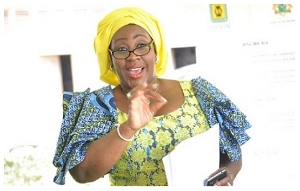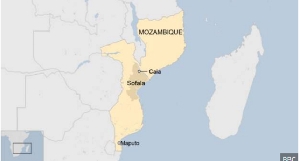- Home - Sports
- Soccer Portal
- Archived Sports News
- Sports Videos | TV
- Year In Review
- Sports Photos
- Sports Headlines
- Boxing
- Athletics
- Basketball
- Bodybuilding
- Cricket
- Golf
- Handball
- Hockey
- Martial Arts
- Tennis
- Volleyball
- Other Sports

Press Releases of Wednesday, 27 May 2020
Source: Institute for Democratic Governance (IDEG)
Negotiating a way forward on the impasse over the compilation of a new BVR for the December 2020 elections
With barely six (6) months to the December, 2020 elections, the country's political arena has been hit by a profound political polarization that appears not to be amenable to any political mediation.
At the core of the polarization is the wide disagreement between the two major parties, the New Patriotic Party (NPP) and National Democratic Congress (NDC) and their allied parties over the decision of the Electoral Commission (EC) to compile a new register which requires general registration of voters.
This brand new register will replace the current one which the EC adopted in 2012, for the conduct of the December 2020 elections. Our democracy has evolved and this brand new register has the potential to be the ideal register if it is done in a manner that eliminates all the problems and mistrust associated with the current register.
Driving the persistent disagreement is the entrenched and seemingly non-negotiable position of each party, that victory or defeat in the 2020 elections will be critically dependent on which electoral roll is used, the existing one or the proposed one to be compiled by the EC.
In spite of all the technological argumentation for and against the compilation of a brand new voters' register, what underpins the impasse is the mutual suspicion based on the conspiracy theory that the existing or new register wili be electorally favorable to one party and put the other at a huge disadvantage.
In the absence of a credible mediation, the positions of the two parties have remained poles apart with no prospect of any negotiated compromise that could influence the EC to change course and consider alternative options for resolving the crisis created by the decision to compile a brand new register.
The outbreak of the COVID-19 pandemic has dramatically changed the context of the decision to compile a new voters register for the 2020 elections.
A three-week partial lockdown in four cities and imposition of restrictions on movement and social gatherings throughout the country since March compelled the EC to suspend its general voters' registration exercise scheduled for April 18 to May 31, 2020, leading to the reduction of 43 days from the EC's 2020 calendar of activities.
Even if the restrictions on movement and social gatherings are officially lifted, Ghanaians, for fear of contracting the COVID-19 virus may be extremely cautious not to risk getting infected in the process of registering as a voter.
The risk of infection through general registration could be elevated by the fact that the required ID for registration has been restricted to the Ghana card and the Ghana passport which are now not available to the majority of Ghanaians. The vast majority of applicants can only register by two registered voters guaranteeing their citizenship which could mean more people gathering at the registration centre.
Without alternative options for handling the crisis over the compilation of a new register we run the risk of recording one of the lowest turn-outs for both the voters' registration and the December election and with it the legitimacy of any government elected on the register.
Objective observers would realize by now that in the context of the COVID-19 pandemic, the kind of politics being played by the two major political parties is dangerous to the general health, peace and security, democratic stability and economic prosperity of the Ghanaian nation.
However, this new context in which the 2020 elections will occur calls for a different kind of democratic politics than the two parties are offering. A more accommodating and selfless driven politics based on greater understanding of the need for unity of purpose, political cooperation and love for the nation Ghana is what we expect of the two parties in particular.
The inter-party conflict over the ideal register for the December 2020 elections has intensified the political polarization of the nation and driven it towards potential electoral violence and constitutional crisis. If this trend continues, it could cause the breakdown of the multiparty democracy in the Fourth Republic.
To turn this undesirable situation around, we urge the two major parties in particular and the political parties in general to now present alternative proposals to the EC on the basis of which the stalemate over the compilation of the new register for the December 2020 election will be amicably and expeditiously resolved.
Fortunately for the nation, the EC, NPP and NDC have each signaled a gradual softening of their initial positions and a positive shift towards a more pragmatic stance. For instance, the EC has indicated that if COVID-19 conditions make the compilation of a brand new register problematic, all efforts will be exerted to update and use the existing register; despite the technological challenges they have alluded to.
Similarly, the NPP is convinced that if the EC were to use the existing register for the election it will compete and win. Meanwhile, the NDC has also indicated its willingness to participate in an election with the brand new register, in spite of its reservations.
In view of the above, we urge all stakeholders to work together with the EC in order to end the stalemate over the register for the December 2020 elections.
We appeal to the largest opposition party the NDC not to boycott the Interparty Advisory Committee (IPAC) meeting on Wednesday 27th May but to attend and engage constructively in the search for a pragmatic solution.
We further urge the EC to elaborate its plans to hold the upcoming general elections fully within the COVID-19 context, with or without the prevailing restrictions.
We believe that If these things are done, it will strengthen inter-party cooperation and collaboration with the EC and enhance successful delivery of the 2020 elections.
God bless our homeland Ghana
Yours faithfully,
Luelle
Mr. Kwesi JONAH Senior Research Fellow and Head, Advocacy and Institutional Relations










